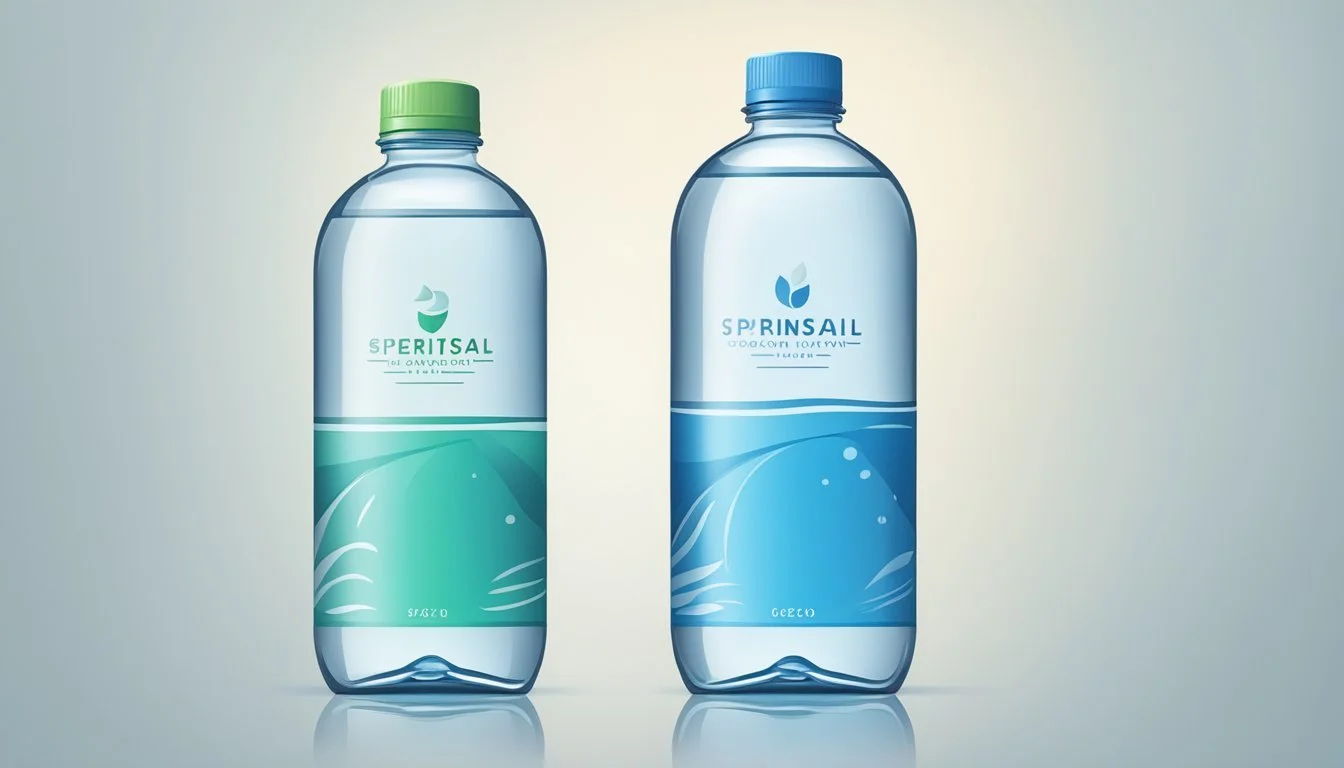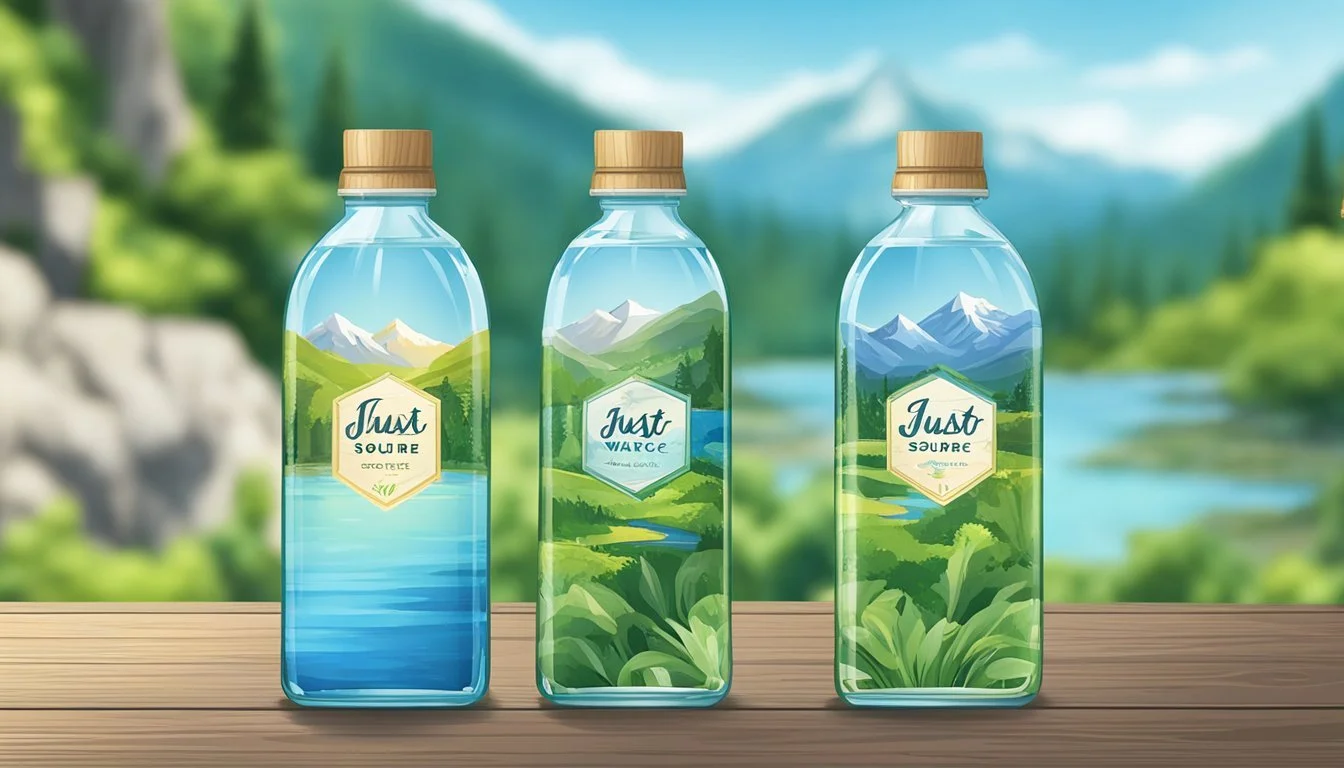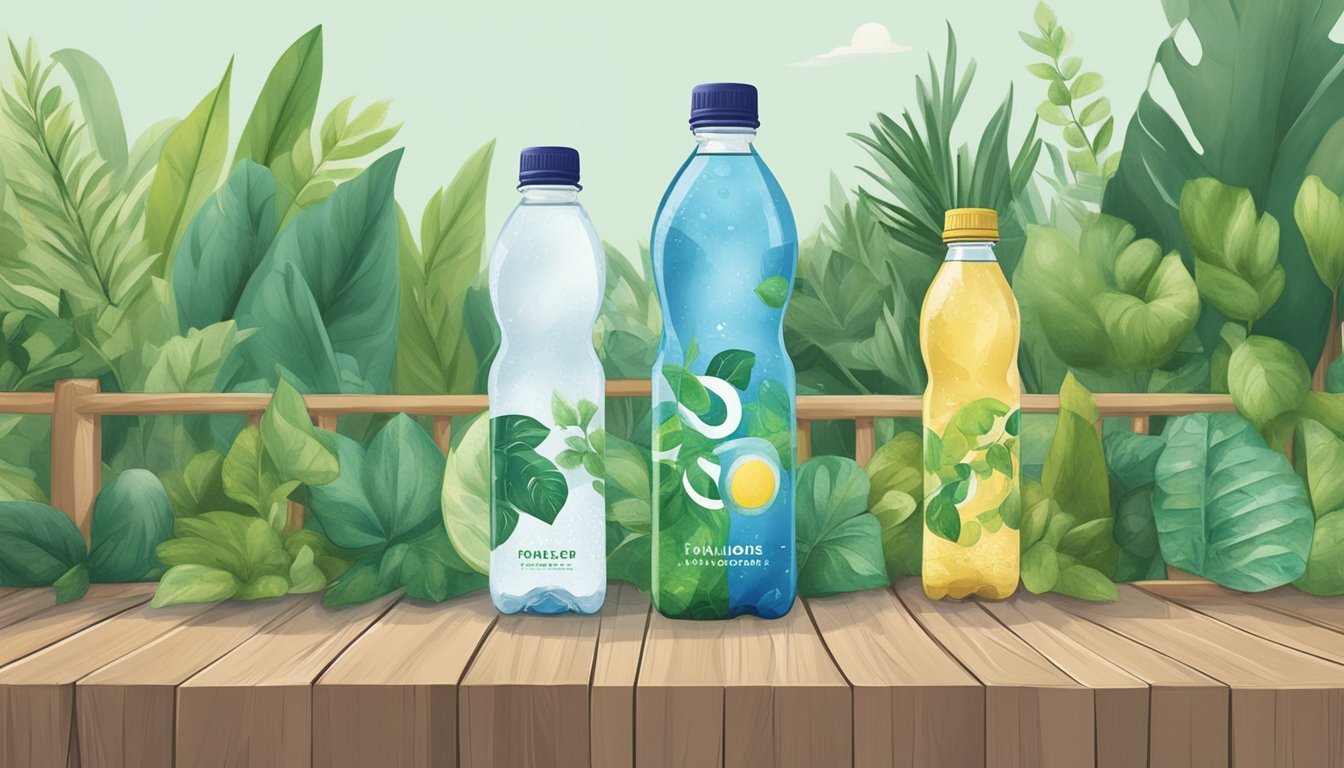Just Water vs. Proud Source
The Ultimate Bottled Water Comparison
When it comes to choosing between Just Water and Proud Source, both brands offer distinct advantages for bottled water enthusiasts. Just Water, co-founded by Jaden Smith, emphasizes sustainability. Its packaging is 82% plant-based and it claims to have a lower carbon footprint compared to traditional plastic bottles.
On the other hand, Proud Source boasts a pH level of 8.1 and a TDS (total dissolved solids) reading of 132 ppm, making it a prime choice for those who appreciate high mineral content in their drinking water. In addition, Proud Source sources its water from American mountain springs, which contributes to its reputation for purity and taste.
If sustainability is your top priority, Just Water shines with its plant-based packaging and eco-friendly initiatives. Conversely, if you prioritize mineral content and water quality, Proud Source stands out with its impressive TDS levels and alkaline nature. Both options have unique selling points that cater to different consumer needs.
Understanding Bottled Water
Bottled water has become a significant part of many people's daily lives, driven by perceptions of safety, convenience, and taste. Detailed below are the history and growth, and the different types of bottled water available on the market.
History and Growth of Bottled Water
The bottled water industry has seen substantial growth over the past few decades. Bottled water was first mass-produced in the early 20th century, but it gained major popularity in the late 1970s and early 1980s.
This growth is attributed to increasing concerns about tap water quality, advancements in bottling techniques, and heavy marketing by major brands. By the 2000s, bottled water had become a staple in many homes, significantly influencing consumer habits around hydration.
Corporate players have introduced various subcategories such as spring water, mineral water, and purified water, each targeting different consumer preferences.
Different Types of Bottled Water
There are several types of bottled water, each catering to specific needs:
Spring Water: Sourced from natural springs, it is collected at the source and often valued for its natural mineral content and taste.
Mineral Water: Contains naturally occurring minerals and is often sought for its health benefits. It must contain at least 250 parts per million total dissolved solids from a natural source.
Purified Water: Typically produced by distillation, deionization, or reverse osmosis, this type is free from most types of impurities. It often starts as tap water before undergoing extensive purification processes.
These categories aim to offer a range of benefits, from the perceived safety and purity to taste variations, and convenience, driving their widespread consumption.
Comparing Just Water and Proud Source
Both Just Water and Proud Source emphasize sustainability and offering fresh, pure water sourced from natural springs. The key differences lie in their brand origins, sourcing, production processes, taste, and purity.
Brand Origins and Philosophy
Just Water was founded by Jaden Smith with a focus on sustainability and renewable resources. The packaging uses 82% plant-based materials to minimize environmental impact.
Proud Source aims to provide premium quality water while maintaining eco-friendly practices. Proud Source uses aluminum bottles, which are infinitely recyclable, underscoring their commitment to reducing plastic waste.
Both brands are dedicated to sustainability, but they employ different methods to achieve their goals, reflecting their unique philosophies.
Source and Production Processes
Just Water is sourced from a spring in Glens Falls, New York. They implement a gravity-fed water system, which requires minimal energy.
Proud Source sources its water from springs in Idaho's Rocky Mountains. Their production facility is situated at the source, reducing the need for extensive transportation and lowering the carbon footprint.
While both brands prioritize ethical sourcing, Just Water focuses more on renewable packaging, whereas Proud Source emphasizes recyclable materials and localized bottling.
Taste and Purity
Just Water offers a clean, crisp taste with a slightly alkaline pH of 8.0, enhancing its refreshing qualities. The water is rigorously tested to ensure it meets high purity standards.
Proud Source boasts a naturally occurring high alkalinity with a pH of 8.5. This gives the water a smooth, refreshing taste that many find appealing. Proud Source also emphasizes the absence of additives or artificial treatments.
Both waters are praised for their purity and taste, but slight variations in alkalinity might influence consumer preference based on individual taste profiles.
Environmental Considerations
The environmental impact of bottled water brands hinges on their packaging materials and carbon footprint from production to transportation.
Packaging and Material Use
Just Water employs a paper-based bottle with a bio-plastic cap, aiming to minimize plastic use. The bottle consists of 54% paper, 28% plant-based plastic, and 18% traditional plastic. This design is recyclable and BPA-free.
Proud Source uses aluminum bottles, which are infinitely recyclable and provide a more sustainable alternative to single-use plastics. Aluminum recycling consumes less energy compared to producing new material, resulting in lower environmental impacts. Both brands seek sustainable packaging, but Proud Source’s use of aluminum gives it an edge in recyclability.
Carbon Footprint and Transportation
The carbon footprint of Just Water is reduced by sourcing spring water locally in the U.S., cutting down on transportation-related CO2 emissions. Additionally, their renewable energy initiatives further lessen their environmental impact.
Proud Source also prioritizes local sourcing to limit transportation emissions. By using aluminum bottles, which are lighter than glass, they lower energy requirements for shipping. Furthermore, the production and recycling of aluminum generate fewer emissions compared to new plastic manufacturing, underscoring their commitment to reducing carbon footprints.
Each brand's approach to packaging and transportation highlights its dedication to sustainability and environmental responsibility.
Health and Safety Aspects
The health and safety of bottled water depend on quality control processes and regulatory compliance to ensure safe drinking water free from contaminants.
Quality Control and Contaminants
Both Just Water and Proud Source implement rigorous quality control measures.
These brands often test for contaminants like lead and other heavy metals to ensure their water remains safe. Consistent monitoring helps identify and eliminate harmful substances, maintaining the quality of the water.
Microplastics are another concern. Both companies highlight their efforts to reduce or eliminate microplastic contamination through advanced filtration methods. Regular testing and transparent reporting of water quality assure consumers about the safety of the water they are drinking. Adherence to strict guidelines ensures the integrity of their products.
FDA Regulations and Compliance
Just Water and Proud Source must comply with FDA regulations to ensure their bottled water meets safety standards.
The FDA’s regulations require bottled water to meet the same safety standards as tap water, as outlined by the Environmental Protection Agency (EPA). This includes limits on contaminants and routine water quality testing.
Compliance with these regulations reassures consumers about the safety and quality of the product. Both Just Water and Proud Source also provide clear labeling and water quality reports to foster transparency and trust. Regular compliance checks and adherence to FDA and EPA standards form an essential part of their safety protocols.
Price and Accessibility
Choosing between Just Water and Proud Source involves evaluating both cost and availability. Each brand has distinct pricing strategies and availability in various markets, which will be discussed in more detail below.
Cost Analysis and Market Pricing
Just Water typically offers a more budget-friendly option. A 500ml bottle generally costs around $1 to $2. They are known for using 100% spring water and eco-friendly packaging, which helps keep costs relatively low without compromising quality.
Proud Source, on the other hand, markets itself as a premium product. Pricing for a 500ml bottle often ranges from $2.50 to $3.50. The higher cost stems from sourcing mineral-rich water from sustainable springs and using aluminum bottles, which are both recyclable and perceived as more eco-friendly but expensive to produce.
Comparison Table:
Brand Price (500ml) Packaging Just Water $1.00 - $2.00 Plant-based Proud Source $2.50 - $3.50 Aluminum
The table illustrates the pricing differences, with Just Water being the more inexpensive choice, while Proud Source targets a higher market segment.
Availability in Grocery Stores and Online
Just Water is widely available in major grocery stores and online platforms. They have partnered with large retailers, making it easy to find their products in various locations. Accessibility is enhanced by their affordable pricing, which attracts a broad consumer base.
Proud Source, although slightly less widespread, is available in specialty grocery stores and health food markets. Its presence online is robust, with availability on leading ecommerce platforms like Amazon. The premium nature of Proud Source may limit its stock in smaller outlets, but its online availability compensates for any gaps in physical store presence.
Key Points:
Just Water: Extensive availability in large grocery chains and affordable pricing.
Proud Source: Found mainly in specialty stores, with a strong online presence.
These factors help consumers easily access and purchase bottled water that fits their preferences and budget.
Consumer Experience
When evaluating Just Water and Proud Source, two critical factors are the design of the bottle and the taste of the water. Each brand aims to provide a unique consumer experience, emphasizing both practicality and flavor quality.
Bottle Design and Convenience
Just Water features a reusable bottle made from 54% paper, which reduces plastic usage. This carton design is light and easy to carry, enhancing convenience for consumers on-the-go. The cap and shoulder are made from plant-based plastic, contributing to its eco-friendly appeal.
In contrast, Proud Source offers aluminum bottles that are infinitely recyclable. The robust metal shell protects the water from light and air, helping to maintain its purity. Many consumers appreciate the premium feel and durability of these aluminum bottles.
Taste Profile and Water Sommelier Insights
Just Water has a clean, crisp taste with a slightly sweet undertone, derived from its source in the Glens Falls watershed in Upstate New York. Water sommeliers often note the low mineral content, which contributes to its smooth and soft flavor.
Proud Source water, sourced from natural springs in Idaho and Georgia, has a distinctive minerality and smooth texture. Experts highlight its balanced mix of essential minerals like calcium and magnesium, which give it a subtle yet distinct taste profile. Consumers often report a refreshing and satisfying drinking experience, particularly in the still and sparkling varieties.
Combining the eco-conscious design and distinct taste profiles, both brands offer unique consumer experiences that cater to different preferences and values.
Alternatives to Bottled Water
Exploring efficient and eco-friendly ways to stay hydrated can lead to significant cost savings and environmental benefits. Two practical alternatives are filtering tap water for home use and using reusable water bottles.
Filtering Tap Water for Home Use
Filtering tap water is a highly effective method to ensure clean drinking water. Home water filtration systems can remove contaminants such as chlorine, lead, and bacteria. Popular types include activated carbon filters, reverse osmosis systems, and UV purifiers.
Benefits of filtering tap water:
Cost-effective: Significantly cheaper than purchasing bottled water.
Environmentally friendly: Reduces plastic waste and lowers carbon footprint.
Convenient: Offers a constant and readily available source of clean water.
Reusable Water Bottles and the Environment
Reusable water bottles are an excellent choice for reducing plastic waste. They come in materials like stainless steel, glass, and BPA-free plastic. Besides being environmentally friendly, they offer various features such as insulation to keep drinks cold or hot for extended periods.
Advantages of using reusable water bottles:
Sustainability: Reduces reliance on single-use plastics.
Cost savings: Eliminates the recurring expense of buying bottled water.
Health benefits: Often free from potentially harmful chemicals found in some plastic bottles.
By adopting filtering solutions and reusable bottles, individuals can make a significant impact on both their wallet and the environment.
More About Just Water
Core Hydration vs Just Water: Which Bottled Water is Better?
Icelandic Glacial vs Just Water: Which Bottled Water is Better?
Just Water vs Aqua Carpatica: Which Bottled Water is Better?
Just Water vs Cascade Mountain: Which Bottled Water is Better?
Just Water vs Crystal Geyser: Which Bottled Water is Better?
Just Water vs Hawaii Volcanic: Which Bottled Water is Better?
Just Water vs Hawaiian Springs: Which Bottled Water is Better?
Just Water vs Kirkland Signature: Which Bottled Water is Better?
Just Water vs Mountain Valley Spring Water: Which Bottled Water is Better?
Just Water vs Nestle Pure Life: Which Bottled Water is Better?
Just Water vs Richard's Rainwater: Which Bottled Water is Better?
Just Water vs San Pellegrino: Which Bottled Water is Better?
Just Water vs Solan de Cabras: Which Bottled Water is Better?
Just Water vs Talking Rain AQA: Which Bottled Water is Better?
Just Water vs Whole Foods 365: Which Bottled Water is Better?
Just Water vs Whole Foods Italian Still Mineral water: Which Bottled Water is Better?
More About Proud Source
Aqua Carpatica vs Proud Source: Which Bottled Water is Better?
Cascade Mountain vs Proud Source: Which Bottled Water is Better?
Core Hydration vs Proud Source: Which Bottled Water is Better?
Crystal Geyser vs Proud Source: Which Bottled Water is Better?
Crystal Lake vs Proud Source: Which Bottled Water is Better?
Hawaii Volcanic vs Proud Source: Which Bottled Water is Better?
Hawaiian Springs vs Proud Source: Which Bottled Water is Better?
Ice Mountain vs Proud Source: Which Bottled Water is Better?
Icelandic Glacial vs Proud Source: Which Bottled Water is Better?
Kirkland Signature vs Proud Source: Which Bottled Water is Better?
Liquid Death vs Proud Source: Which Bottled Water is Better?
Mountain Valley Spring Water vs Proud Source: Which Bottled Water is Better?
Nestle Pure Life vs Proud Source: Which Bottled Water is Better?
Poland Spring vs Proud Source: Which Bottled Water is Better?
Proud Source vs Essence pH10: Which Bottled Water is Better?
Purely Sedona vs Proud Source: Which Bottled Water is Better?
Richard's Rainwater vs Proud Source: Which Bottled Water is Better?
San Pellegrino vs Proud Source: Which Bottled Water is Better?
Simple Truth vs Proud Source: Which Bottled Water is Better?
Solan de Cabras vs Proud Source: Which Bottled Water is Better?
Talking Rain AQA vs Proud Source: Which Bottled Water is Better?
Whole Foods 365 vs Proud Source: Which Bottled Water is Better?
Whole Foods Italian Still Mineral water vs Proud Source: Which Bottled Water is Better?






